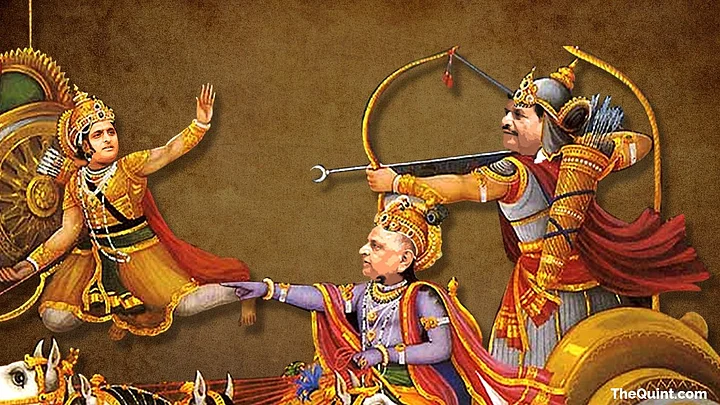The politics of Uttar Pradesh is infused with a strong mythological flavour. The connection is so deep-rooted that even ‘secular’ leaders refer to mythological figures now and then. When Mulayam Singh Yadav expelled his son and Chief Minister Akhilesh Yadav, promptly came a colourful reaction from the man aptly known as ‘Amar Chitra Katha’:
रामचंद्र कह गये सिया से
ऐसा कलियुग आयेगा |
बात बात में मात-पिता को
बेटा आँख दिखायेगा ||
‘Lord Ram told his wife Sita that cultural values will completely break down in the age of Kali i.e. in modern times. So much so that sons will not hesitate to rebuke their fathers on the smallest of the things.’
But Ram is more associated with the politics of the BJP. The ruling Samajwadi Party has more to do with Lord Krishna. After all, the party is now run by and for the Yadavs, who claim to be the descendants of Yadu, a mythological king. And Krishna was a prominent descendant of the same Yadu clan.
As the Yadavs in present-day UP fight it out amongst themselves, some uncanny similarities emerge between them and their mythological ancestors. The story goes like this:
After the 18-day war at Kurukshetra (in present-day Haryana) ceases, Lord Krishna meets Gandhari, the mother of the defeated Kauravas. Angry over the death of her 100 sons, Gandhari curses Krishna with the death of all the Yadavas in a manner similar to the death of her sons.
The Yadavas’ Self-Destruction
By the time the ‘great war’ gets over, Krishna and his fellow Yadavas have moved their capital from Mathura (in present-day UP) to Dwarka (in present-day Gujarat). The youth of the Yadavas grow frivolous and hedonistic in the stable and peaceful kingdom. So much so, that Krishna’s son Samba ridicules a sage and in doing so, invites a curse upon his clan.
As young Yadava men and women indulge in immoral activities, Yadava king Ugrasen (Krishna’s grandfather, the king of the united Yadava kingdom) bans liquor to try and curb their excesses. (By the way, in modern times, CM Akhilesh Yadav said it was “not possible to ban liquor in UP.”)
But the liquor ban couldn’t undo the curses of Gandhari and the sage. As things worsen, Krishna becomes concerned and asks everyone to undertake a pilgrimage to the sacred region of Prabhas (in present-day Gujarat).
Little could Krishna imagine that the remedy would prove catastrophic! The details are terribly interesting. But Maharishi Vyasa has made only a passing reference of this ‘Yadava vs Yadava’ battle in the Mahabharat (Mausala Parva). Instead, Vyasa has chosen to describe the self-destruction of the Yadavas in explicit detail in the Bhagvat Puran, which is devoted to the life of Krishna.
‘Sons Killed Their Fathers’
When lakhs of Yadavas descend into the Prabhas, they go berserk. A trivial argument between two drunk lieutenants provides the flash-point. Drunk on maireyak (a type of liquor), Satyaki criticises Kritavarma for his decisions during the Kurukshetra war, which was long over. Before anyone can get their bearings, it turns into an ugly fight and Satyaki ends up killing Kritavarma! In retaliation, Kritavarma’s associates kill Satyaki.
This soon escalates into violent infighting among the Yadavas. The 30th adhyay of the 11th skandh of Bhagvat Puran says that the infighting among the Yadavas saw many shameful new lows:
पुत्रा अयुध्यन्पितृभिर्भ्रातृभिश्च
स्वस्रीयदौहित्रपितृव्यमातुलैः |
मित्राणि मित्रैः सुहृदः सुहृद्भिर्
ज्ञातींस्त्वहन्ज्ञातय एव मूढाः ||१९||
‘Driven by insanity, sons killed their fathers, brothers killed brothers, nephews killed uncles, grandchildren killed grandfathers, friends killed friends. Those belonging to the same gotra killed each other.’
In an attempt to stop the mayhem, Krishna himself kills some violent, unruly Yadavas. In a way, he becomes part of the chaos. His appeals fall on deaf ears and the pandemonium continues till their “bows are broken and arrows are over.”
But it didn’t stop there. Then began the fist-fighting. “When Lord Krishna and (his brother) Balaram tried to stop them, the Yadavas considered them as their enemy and started hitting them.”
अथ तावपि सङ्क्रुद्धावुद्यम्य कुरुनन्दन |
एरकामुष्टिपरिघौ चरन्तौ जघ्नतुर्युधि ||२३||
‘Then Lord Krishna and Balaram too turn furious and start moving around in the battlefield and whipping fellow Yadavas.’
Surprisingly, when it came to dealing with his own clan, Sri Krishna, who is otherwise portrayed as a great, composed statesman, suddenly appears powerless and ordinary. He immediately packs off a messenger and seeks help from the Pandavas, whom he had helped in the war against the Kauravas.
By the time Arjuna arrives from Indraprastha (present-day New Delhi) to Prabhas (present-day Saurashtra in Gujarat), all the young Yadava men, including Krishna and Balaram, are dead.
Arjuna decides to take the old Yadava men, women and children to Indraprastha. As they leave, the waters rise and Dwarka sinks into the sea. As the surviving Yadavas walk with Arjuna’s army, they are attacked by robbers. Arjuna tries to defend them, but his weapons fail and the Yadavas fall victim. Many women and children panic and scatter in different directions. In the end, only a few Yadavas finally make it to Indraprastha.
PS: When Gandhari (who, by the way, hails from present-day Kandahar in Afghanistan) curses the entire Yadava clan, Krishna accepts the curse and says: ‘There is none in the world who can defeat the Yadavas. Therefore, they shall fall by one another’s hand.’
Perhaps Mulayam and Akhilesh could take a lesson from their namesakes.
